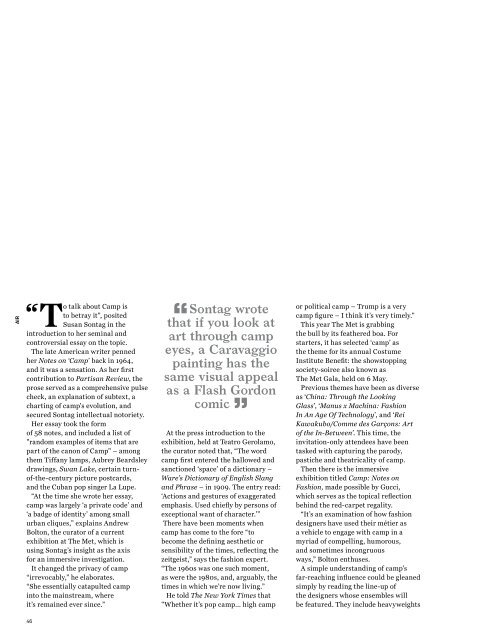AIR May 2019
Create successful ePaper yourself
Turn your PDF publications into a flip-book with our unique Google optimized e-Paper software.
<strong>AIR</strong><br />
“To talk about Camp is<br />
to betray it”, posited<br />
Susan Sontag in the<br />
introduction to her seminal and<br />
controversial essay on the topic.<br />
The late American writer penned<br />
her Notes on ‘Camp’ back in 1964,<br />
and it was a sensation. As her first<br />
contribution to Partisan Review, the<br />
prose served as a comprehensive pulse<br />
check, an explanation of subtext, a<br />
charting of camp's evolution, and<br />
secured Sontag intellectual notoriety.<br />
Her essay took the form<br />
of 58 notes, and included a list of<br />
"random examples of items that are<br />
part of the canon of Camp" – among<br />
them Tiffany lamps, Aubrey Beardsley<br />
drawings, Swan Lake, certain turnof-the-century<br />
picture postcards,<br />
and the Cuban pop singer La Lupe.<br />
“At the time she wrote her essay,<br />
camp was largely ‘a private code’ and<br />
‘a badge of identity’ among small<br />
urban cliques,” explains Andrew<br />
Bolton, the curator of a current<br />
exhibition at The Met, which is<br />
using Sontag’s insight as the axis<br />
for an immersive investigation.<br />
It changed the privacy of camp<br />
“irrevocably,” he elaborates.<br />
“She essentially catapulted camp<br />
into the mainstream, where<br />
it’s remained ever since.”<br />
“<br />
Sontag wrote<br />
that if you look at<br />
art through camp<br />
eyes, a Caravaggio<br />
painting has the<br />
same visual appeal<br />
as a Flash Gordon<br />
comic<br />
”<br />
At the press introduction to the<br />
exhibition, held at Teatro Gerolamo,<br />
the curator noted that, “The word<br />
camp first entered the hallowed and<br />
sanctioned ‘space’ of a dictionary –<br />
Ware’s Dictionary of English Slang<br />
and Phrase – in 1909. The entry read:<br />
‘Actions and gestures of exaggerated<br />
emphasis. Used chiefly by persons of<br />
exceptional want of character.’”<br />
There have been moments when<br />
camp has come to the fore “to<br />
become the defining aesthetic or<br />
sensibility of the times, reflecting the<br />
zeitgeist,” says the fashion expert.<br />
“The 1960s was one such moment,<br />
as were the 1980s, and, arguably, the<br />
times in which we’re now living.”<br />
He told The New York Times that<br />
"Whether it’s pop camp... high camp<br />
or political camp – Trump is a very<br />
camp figure – I think it’s very timely."<br />
This year The Met is grabbing<br />
the bull by its feathered boa. For<br />
starters, it has selected ‘camp’ as<br />
the theme for its annual Costume<br />
Institute Benefit: the showstopping<br />
society-soiree also known as<br />
The Met Gala, held on 6 <strong>May</strong>.<br />
Previous themes have been as diverse<br />
as ‘China: Through the Looking<br />
Glass’, ‘Manus x Machina: Fashion<br />
In An Age Of Technology’, and ‘Rei<br />
Kawakubo/Comme des Garçons: Art<br />
of the In-Between’. This time, the<br />
invitation-only attendees have been<br />
tasked with capturing the parody,<br />
pastiche and theatricality of camp.<br />
Then there is the immersive<br />
exhibition titled Camp: Notes on<br />
Fashion, made possible by Gucci,<br />
which serves as the topical reflection<br />
behind the red-carpet regality.<br />
“It’s an examination of how fashion<br />
designers have used their métier as<br />
a vehicle to engage with camp in a<br />
myriad of compelling, humorous,<br />
and sometimes incongruous<br />
ways,” Bolton enthuses.<br />
A simple understanding of camp’s<br />
far-reaching influence could be gleaned<br />
simply by reading the line-up of<br />
the designers whose ensembles will<br />
be featured. They include heavyweights<br />
46

















